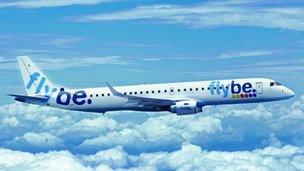Flybe shares slump 20% on revenue warning
- Published
Shares in Flybe have slumped more than 20% after the airline warned that weak UK sales meant it was unlikely to meet revenue targets for this year.
The company said sales in the final three months of 2011 were down about 8% on a year earlier, with December being "particularly disappointing".
This has led to a "significant shortfall" against revenue forecasts, the Exeter-based airline said.
It does not expect to recover this shortfall before the tax year end.
Flybe said conditions in the UK domestic air travel market had continued to deteriorate.
It said maintaining passenger numbers and growing market share was more important than increasing margins, which it had hoped to do.
"Based on latest sales trends, we believe that challenging market conditions will continue for the rest of the financial year," the company said.
These conditions "will force" rationalisation of the European short-haul airline market, something it was well positioned to benefit from, it added.
'Significant slowdown'

"The UK domestic market is clearly challenging," said Flybe boss Jim French.
"Under such circumstances, notwithstanding the shortfall against our revenue expectations, I believe that maintaining volumes and growing market share at the expense of planned yield increases was the correct decision to protect the long-term potential of Flybe."
At one point on Tuesday, Flybe's shares were down by about a third. Shares in the airline have fallen more than 80% since the start of 2011.
In October, the airline issued its second profits warning in five months, noting a "significant slowdown in sales".
Analysts said the company was suffering from a general decline in demand for air travel during the economic downturn.
"Demand is not what they thought it would be and customers are not willing to pay quite what they had hoped," Douglas McNeill, airline analyst at Charles Stanley, told the BBC.
"The airline isn't doing anything wrong and has a good grip on costs. Ultimately, it has to hope demand picks up as there are not many levers the management can pull."
However, he noted that there was "no immediate prospect of a serious recovery [in demand]".